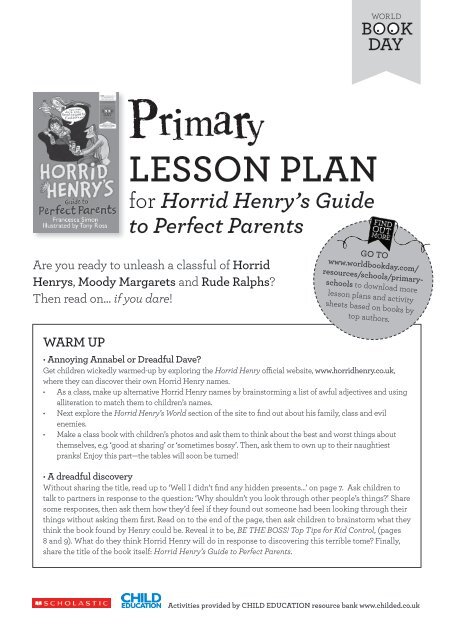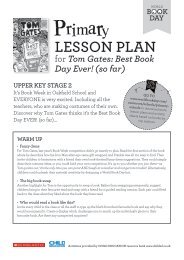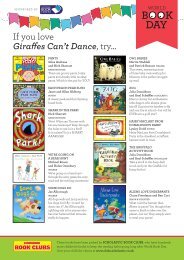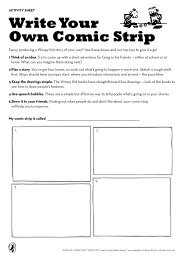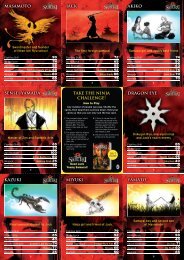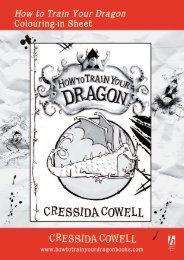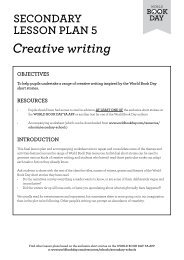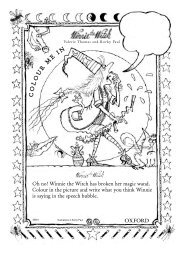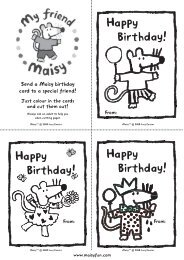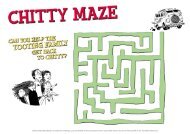You also want an ePaper? Increase the reach of your titles
YUMPU automatically turns print PDFs into web optimized ePapers that Google loves.
<strong>LESSON</strong> <strong>PLAN</strong>for Horrid Henry’s Guideto Perfect ParentsAre you ready to unleash a classful of HorridHenrys, Moody Margarets and Rude Ralphs?Then read on… if you dare!GO TOwww.worldbookday.com/resources/schools/primaryschoolsto download morelesson plans and activitysheets based on books bytop authors.WARM UP• Annoying Annabel or Dreadful Dave?Get children wickedly warmed-up by exploring the Horrid Henry official website, www.horridhenry.co.uk,where they can discover their own Horrid Henry names.• As a class, make up alternative Horrid Henry names by brainstorming a list of awful adjectives and usingalliteration to match them to children’s names.• Next explore the Horrid Henry’s <strong>World</strong> section of the site to find out about his family, class and evilenemies.• Make a class book with children’s photos and ask them to think about the best and worst things aboutthemselves, e.g. ‘good at sharing’ or ‘sometimes bossy’. Then, ask them to own up to their naughtiestpranks! Enjoy this part—the tables will soon be turned!• A dreadful discoveryWithout sharing the title, read up to ‘Well I didn’t find any hidden presents…’ on page 7. Ask children totalk to partners in response to the question: ‘Why shouldn’t you look through other people’s things?’ Sharesome responses, then ask them how they’d feel if they found out someone had been looking through theirthings without asking them first. Read on to the end of the page, then ask children to brainstorm what theythink the book found by Henry could be. Reveal it to be, BE THE BOSS! Top Tips for Kid Control, (pages8 and 9). What do they think Horrid Henry will do in response to discovering this terrible tome? Finally,share the title of the book itself: Horrid Henry’s Guide to Perfect Parents.Activities provided by CHILD EDUCATION resource bank www.childed.co.uk
MAIN ACTIVITIES• The Patented Prototype for Perfect ParentsRead up to page 12 where there is a description of what perfect parents might be like. Use this as a basisfor a class discussion: What does a perfect parent look like? What do they do?Fix a large outline of a person onto the wall. Working in small groups, children can add labelled picturesto the outline. E.g. a large wallet for dishing out pocket money, a shopping bag full of treats, or a big smile(as the perfect parent would never get cross). Now challenge children to consider what the consequencesof these ideas might be. E.g. if you only ate treats, what would happen? If your parents were happy nomatter what you did, what kind of person might you grow up to be?• Family therapyEnjoy reading the rest of the book. Agree with children that Horrid Henry’s parents are trying to managehim, just as he’s trying to manage them. Carry out role-play interviews with the parents on one side andHorrid Henry on the other. Explore how each feels using the sentence starters on the activity sheet RoleplayInterview Starters. Can they see things from both points of view? Invite children to share timeswhen they’ve thought something was unfair. Why do they think their parents acted as they did?• A really brilliant bookTell children that they’re going to create a class book: Top Secret Tips for Teacher Taming. Discussthe ways in which teachers encourage children do what they want—e.g. merit points, gold stars, awards,detentions, time out, etc.Using Henry’s Tips as a model, brainstorm what children could get away with if they tamed their teacher.Together agree some section headings for the book such as:• How to make your teacher do your work for you• How to get your own way at break times• How to avoid doing any homework• How to get out of assembly• How to enjoy unhealthy snacks instead of fruitDivide the class into groups, and allocate a different section of the book to each one. What would theirtop tips be? Use their ideas as the basis for a discussion about what the atmosphere would be like in theclass if this guide were followed. What would the consequences be?Activities provided by CHILD EDUCATION resource bank www.childed.co.uk
EXTENSION ACTIVITIES• But I said ‘No!’Use the activity sheet Seeing Both Sides, to further explore seeing situations from the point of view ofothers. Ask children to act them out to the rest of the class. For each one, can the class find a compromise?• Them’s the rulesGive out a selection of cards from the activity sheet, Rules, rules, rules, for children to read in small groups.Take turns to share them with the rest of the class, and then sort them using overlapping PE hoops tocreate a Venn diagram on the floor. The labels should be Rules Horrid Henry would like, Rules Henry’sparents would like and Rules Henry and his parents would like.Which side has more rules? Why do you think that is? How could you ensure that there are more rules inthe overlap section?PLENARYEncourage children to share their responses to these killer questions:• What do you think Horrid Henry would be like as an adult?• What kind of parent do you think he would be?• Would you like to be horrid like Henry? Why? Why not?FURTHER READING• The Most Impossible Parents by Brian Patten (walker)• The Adventures of Captain Underpants by Dav Pilkey (scholastic)• My Brother’s Hot Cross Bottom by Jeremy Strong (puffin)• Agatha Parrot and the Mushroom Boy by Kjartan Poskitt (egmont)• Ghost Buddy: Zero to Hero by Henry Winkler (scholastic)• Horrid Henry’s website www.horridhenry.co.ukActivities provided by CHILD EDUCATION resource bank www.childed.co.uk
ACTIVITY SHEETfor Horrid Henry’s Guideto Perfect ParentsROLE-PLAY INTERVIEW STARTERSSentence starters for role-play interviews between parents and Henry:PARENT: When Henry talks about how great Ralph’s parents are all the time, I feel…HENRY: It’s not fair, Ralph’s parents let him…✂PARENT: I ask Henry to help around the house because…HENRY: I’m not a slave! I shouldn’t have to clean up because…PARENT: When Henry winds me up I get really angry and I…HENRY: When I see Mum yelling and screaming, I think…HENRY: I like to have a real tantrum in public because…PARENT: When Henry starts screaming in public, it is horrible because…PARENT: Henry gets plenty of pocket money. The amount is reasonable because…HENRY: There are lots of things I need to buy! Of course I need more pocket money because…PARENT: When Henry won’t eat any of the delicious food I have prepared, I feel…HENRY: When I see salad and vegetables on my plate I think…PARENT: Henry should definitely be in bed by 8 o’clock because…HENRY: I should definitely stay up late every night because…Activities provided by CHILD EDUCATION resource bank www.childed.co.uk
ACTIVITY SHEETfor Horrid Henry’s Guideto Perfect ParentsSEEING BOTH SIDESScenarios written in separate boxes to be cut out and distributed.✂You want to go out, butyour parents say no.You want a dog, butyour parents say no.You want to play a computergame with a 12 certificate butyour parents say no.You want to buy a newtop but your parentssay it isn’t suitable.Your friends allget more pocketmoney than you.You want to go to your friend’s party,but your parents say you have tovisit your aunty.Activities provided by CHILD EDUCATION resource bank www.childed.co.uk
ACTIVITY SHEETfor Horrid Henry’s Guideto Perfect ParentsRULES, RULES, RULESWritten in separate boxes to be cut out and distributed.RULE: Leave wettowels on your bed.RULE: Argue with everyone, even if you really agree.✂RULE: Have fun atthe weekends.RULE: Keep your feet off the furniture.RULE: Keep yourbedroom tidy.RULE: Play loud musicwhen others are asleep.RULE: Be kindto everyone.RULE: Leave toysout in the garden.RULE: Don’t snoop inother people’s things.RULE: Shareyour toys.RULE: Clear upyour own mess.RULE: Do your homework first, before you play.Activities provided by CHILD EDUCATION resource bank www.childed.co.uk
CURRICULUM LINKS (National Curriculum KS1)ENGLISHEN 1 (Speakingand Listening)EN 2 (Reading)EN3 (Writing)2. To listen, understand and respond toothers, pupils should be taught to:a) sustain concentrationb) remember specific points thatinterest themc) make relevant commentsd) listen to others’ reactions3. To join in as members of a group,pupils should be taught to:a) take turns in speakingb) relate their contributions to what hasgone on beforec) take different views into accountd) extend their ideas in the light ofdiscussione) give reasons for opinions and actions.4. To participate in a range of dramaactivities, pupils should be taught to:a) use language and actions to exploreand convey situations, characters andemotions.b) create and sustain roles individuallyand when working with others.Breadth of study should include:8. Speakingc) describing events and experiences9. Listeninga) opportunities to listen to each other10. Group discussion and interactionb) sharing ideas and experiencesc) commenting and reporting11. Drama should includea) working in roleb) presenting drama and storiesto othersc) responding to performances.3. To develop their understandingof fiction, poetry and drama, pupilsshould be taught to:a) identify and describe characters,events and settings in fictionb) use their knowledge of sequence andstory language when they are retellingstories and predicting events.f) respond imaginatively in differentways to what they read.6. The range (of literature) shouldinclude:a) stories and poems with familiarsettings and those based on imaginaryor fantasy worldsb) stories, plays and poems bysignificant children’s authors.1. COMPOSITION.Pupils should be taught to:a)Use adventurous and wide-rangingvocabularyc)Put their ideas into sentencesd)use a clear structure to organisetheir writinge)vary their writing to suit the purposeand readerf)use the texts they read as models fortheir own writing2. <strong>PLAN</strong>NING AND DRAFTING.Working with the teacher and withothers, in order to develop theirwriting, pupils should be taught to:c) plan and review their writing,discussing the quality of what iswritten9.Breadth of study. The range ofpurposes for writing should include:c) to explore experiencePSHE &CitizenshipDeveloping confidence andresponsibility and makingthe most of their abilitiesPreparing to play anactive role as citizensDeveloping relationshipsand respecting thedifferences between people.Pupils should be taught:1a) to recognise what they like anddislike, what is fair and unfair, and whatis right and wrongb) to share their opinions on things thatmatter to them and explain their viewsd) to think about themselves, learn fromtheir experiences and recognise whatthey are good at.Pupils should be taught:2a) to take part in discussions with oneother person and the whole classb) to take part in a simple debate abouttopical issuesc) to recognise the choices they canmake, and recognise the differencebetween right and wrongf) that they belong to various groupsand communities such as family andschoolPupils should be taught:4a) to recognise how their behaviouraffects other peopleb to listen to other people, and playand work cooperativelyd) that family and friends should carefor each otherBreadth of opportunities5g) Consider social and moraldilemmas that they come across ineveryday life.Activities provided by CHILD EDUCATION resource bank www.childed.co.uk


